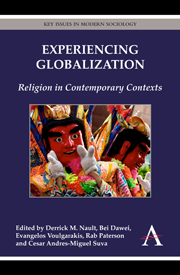Book contents
- Frontmatter
- Contents
- Preface
- Chapter 1 Introduction
- Part One Religion in Global and Transcultural Perspective
- Part Two Comparative and Pluralistic Approaches
- Chapter 5 Mary, Athena and Guanyin: What the Church, the Demos and the Sangha Can Teach Us about Religious Pluralism and Doctrinal Conformity to Socio-cultural Standards
- Chapter 6 The Globalization of the New Spirituality and its Expression in Japan: The Case of Mt Ikoma
- Chapter 7 Globalization and Religious Resurgence: A Comparative Study of Bahrain and Poland
- Part Three Religion in Taiwan
- List of Contributors
Chapter 6 - The Globalization of the New Spirituality and its Expression in Japan: The Case of Mt Ikoma
from Part Two - Comparative and Pluralistic Approaches
Published online by Cambridge University Press: 05 May 2013
- Frontmatter
- Contents
- Preface
- Chapter 1 Introduction
- Part One Religion in Global and Transcultural Perspective
- Part Two Comparative and Pluralistic Approaches
- Chapter 5 Mary, Athena and Guanyin: What the Church, the Demos and the Sangha Can Teach Us about Religious Pluralism and Doctrinal Conformity to Socio-cultural Standards
- Chapter 6 The Globalization of the New Spirituality and its Expression in Japan: The Case of Mt Ikoma
- Chapter 7 Globalization and Religious Resurgence: A Comparative Study of Bahrain and Poland
- Part Three Religion in Taiwan
- List of Contributors
Summary
Introduction
The development of New Spirituality, also called New Age or alternative spiritualities, is closely associated with globalization, a process that mobilizes a wide range of religious referents and practices. However, globalization does not imply merely a local, passive appropriation of external religious beliefs and practices, for it involves interactions with local contexts that in turn provide symbols and ideologies leading to cultural hybridity. In this regard, new Spirituality has found fertile soil in Japan, a nation that has long cultivated a religious culture that is vibrant and dynamic in its own right, yet is receptive to foreign influences that suit local purposes.
The present work is part of an ongoing research project and is partly based on the data collected during fieldwork in the summer of 2009 around Mt Ikoma, a mountain range in the Kinki area of Japan where the religious culture has been shaped by Buddhist schools of thought, folk religion, Korean shamanism and New Religions. Due to the paucity of information on new spirituality in Ikoma and limited empirical data collected through fieldwork to date, this research is still in its infancy and as such this chapter only aspires to: 1) provide an overview of the emergence of New Spirituality in Mt Ikoma; and 2) explore the neo-syncretism or interaction of New Spirituality with Ikoma’s traditional religious culture as one way in which New Spirituality and the process of globalization are closely related.
- Type
- Chapter
- Information
- Experiencing GlobalizationReligion in Contemporary Contexts, pp. 109 - 128Publisher: Anthem PressPrint publication year: 2013

